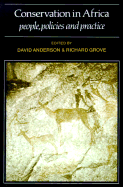Book contents
- Frontmatter
- Contents
- Preface
- List of contributors
- Introduction: The scramble for Eden: past, present and future in African conservation
- Part One Conservation ideologies in Africa
- Part Two Wildlife, Parks and Pastoralist
- Part Three Conservation priorities and rural communities
- Introduction
- 9 Local institutions, tenure and resource management in East Africa
- 10 Conflicting uses for forest resources in the Lower Tana River basin of Kenya
- 11 Environmental degradation, soil conservation and agricultural policies in Sierra Leone, 1895–1984
- 12 Managing the forest: the conservation history of Lembus, Kenya,1904–63
- Part Four Consequences for conservation and development
- Index
9 - Local institutions, tenure and resource management in East Africa
Published online by Cambridge University Press: 04 April 2011
- Frontmatter
- Contents
- Preface
- List of contributors
- Introduction: The scramble for Eden: past, present and future in African conservation
- Part One Conservation ideologies in Africa
- Part Two Wildlife, Parks and Pastoralist
- Part Three Conservation priorities and rural communities
- Introduction
- 9 Local institutions, tenure and resource management in East Africa
- 10 Conflicting uses for forest resources in the Lower Tana River basin of Kenya
- 11 Environmental degradation, soil conservation and agricultural policies in Sierra Leone, 1895–1984
- 12 Managing the forest: the conservation history of Lembus, Kenya,1904–63
- Part Four Consequences for conservation and development
- Index
Summary
Introduction
Considerable attention has been given recently to the role of local institutions and communities in the management of Africa's natural resources (Odell, 1982; Sandford, 1983; Doughlin, Doan & Uphoff, 1984). Much of the research has focused on the part that tenure rules play in resource use and conservation, and has resulted in a highly charged debate dividing, on the one hand, advocates of private property and radically new forms of resource management and, on the other hand, supporters of indigenous tenure systems (often based on some form of collective allocation) and institutions. The empirical evidence to support either side has been flimsy at best, and ahistorical in most cases. Thus, for example, what is proffered as 'proof of institutional inefficiencies among East African herders - for instance, ‘overgrazing’ – is more often a result of historical circumstances that limited the pastoralists' land base, than it is of land mismanagement (Little, 1984).
Here, we examine the role of local institutions and communities in the management of rangelands and forests in East Africa, which until recently were managed on a common property basis, often either neighbourhood- or clan-based.2 Particular attention is given to those variables that are likely to make local resource management systems ineffective. As will be shown, change in tenure patterns is only one of many factors that have implications for natural resource use, and that in specific cases it becomes difficult to disaggregate the causal effects of tenure from other, perhaps even more significant variables.
- Type
- Chapter
- Information
- Conservation in AfricaPeoples, Policies and Practice, pp. 193 - 210Publisher: Cambridge University PressPrint publication year: 1988



